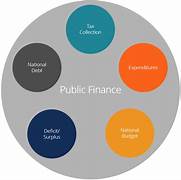Public Finance and Poor Management: What Does It Mean for the Public?
Introduction
Public finance plays a crucial role in shaping a nation’s economic stability and social welfare. It involves the government’s management of revenues, expenditures, and debts to ensure sustainable development and public service delivery. However, when public finances are mismanaged, it can lead to severe economic consequences, negatively impacting the lives of citizens. This article explores the implications of poor financial management in the public sector, the causes behind financial mismanagement, and potential solutions for improving fiscal responsibility.
Understanding Public Finance
Public finance refers to the government’s collection and allocation of resources to meet national priorities such as infrastructure, healthcare, education, and social security. It includes:
- Revenue Collection – Taxation, fees, and other forms of government income.
- Public Expenditure – Government spending on services, projects, and development.
- Budgeting and Fiscal Policies – Allocation of financial resources based on economic planning.
- Debt Management – Borrowing and repayment of government loans.
When managed effectively, public finance fosters economic growth, reduces poverty, and improves citizens’ quality of life. However, poor financial management can lead to inefficiencies, corruption, and economic downturns.
Consequences of Poor Public Finance Management
1. Increased National Debt
When governments fail to manage expenditures effectively, they resort to borrowing. If this debt is not managed strategically, it can spiral out of control, leading to economic instability. Excessive national debt can result in:
- Higher interest payments, reducing funds available for social programs.
- Lower credit ratings, making future borrowing more expensive.
- Risk of default, which can lead to economic crises and loss of investor confidence.
2. Reduced Public Services
Poor financial management often leads to budget deficits, forcing governments to cut spending on essential services like healthcare, education, and public infrastructure. This can result in:
- Overcrowded and underfunded schools.
- Inadequate healthcare facilities and higher medical costs.
- Poor road networks, unreliable public transport, and decaying infrastructure.
3. Inflation and Economic Instability
Governments may attempt to cover budget shortfalls by printing more money, leading to inflation. When inflation rises, the cost of goods and services increases, reducing the purchasing power of citizens and disproportionately affecting lower-income households.
4. Higher Taxes and Burden on Citizens
To compensate for financial mismanagement, governments may impose higher taxes, leading to:
- Increased cost of living.
- Reduced disposable income for families.
- Lower business growth due to higher tax burdens.
5. Corruption and Misallocation of Resources
Poor financial oversight creates opportunities for corruption. Funds meant for public development projects may be diverted for personal gain, leading to:
- Unfinished or low-quality infrastructure projects.
- Bribery and favoritism in government contracts.
- Increased distrust in public institutions.
6. Unemployment and Economic Slowdown
When public funds are mismanaged, investments in key industries decline, affecting employment opportunities. Poor economic policies discourage local and foreign investments, resulting in:
- Job losses and rising unemployment rates.
- Reduced economic growth and slow recovery from recessions.
Causes of Poor Public Finance Management
- Lack of Transparency and Accountability – Governments that fail to disclose financial activities create an environment for mismanagement.
- Weak Institutional Frameworks – Inadequate financial oversight agencies contribute to inefficiencies.
- Political Influence and Short-Term Policies – Policies driven by political interests rather than economic sustainability lead to financial instability.
- Inefficient Tax Collection Systems – Poor enforcement and loopholes in tax laws reduce government revenue.
- Over-Reliance on Debt – Continuous borrowing without a repayment plan worsens financial crises.
Solutions for Better Public Finance Management
1. Strengthening Transparency and Accountability
Governments should adopt transparent financial reporting and allow public scrutiny of budgets and expenditures. Measures include:
- Independent audits of government accounts.
- Digital platforms for real-time public expenditure tracking.
- Whistleblower protections to expose corruption.
2. Implementing Strong Fiscal Policies
Well-structured fiscal policies ensure economic stability. Governments should:
- Maintain balanced budgets and reduce unnecessary expenditures.
- Plan for long-term economic growth rather than short-term political gains.
- Avoid excessive borrowing and focus on self-sustainability.
3. Improving Tax Collection Efficiency
Governments must enhance tax collection by:
- Reducing tax evasion through strict enforcement.
- Simplifying tax procedures to encourage compliance.
- Expanding the tax base to include informal sectors.
4. Investing in Economic Growth and Diversification
Strategic investment in industries that generate revenue and jobs can stabilize public finances. This includes:
- Supporting small and medium enterprises (SMEs).
- Investing in technology and innovation to boost productivity.
- Encouraging foreign direct investments (FDI).
5. Strengthening Public Sector Institutions
Robust financial oversight institutions help prevent mismanagement. Governments should:
- Establish independent financial regulatory bodies.
- Train public officials in financial management best practices.
- Enforce strict legal actions against corruption.
6. Encouraging Public Participation in Budgeting
When citizens have a say in government spending, financial decisions are more responsible. Public participation ensures:
- Alignment of government projects with societal needs.
- Reduced chances of funds being misused.
- Enhanced public trust in financial institutions.
Conclusion
Public finance mismanagement can have severe economic and social consequences, including increased debt, inflation, and poor service delivery. However, with transparency, strong fiscal policies, and efficient tax collection, governments can ensure financial stability and improved public welfare. Strengthening institutions, encouraging investment, and involving citizens in financial decisions are crucial steps toward sustainable economic growth. By prioritizing sound financial management, governments can build a prosperous and equitable society for all.
Let me know if you need any refinements or additional insights!


